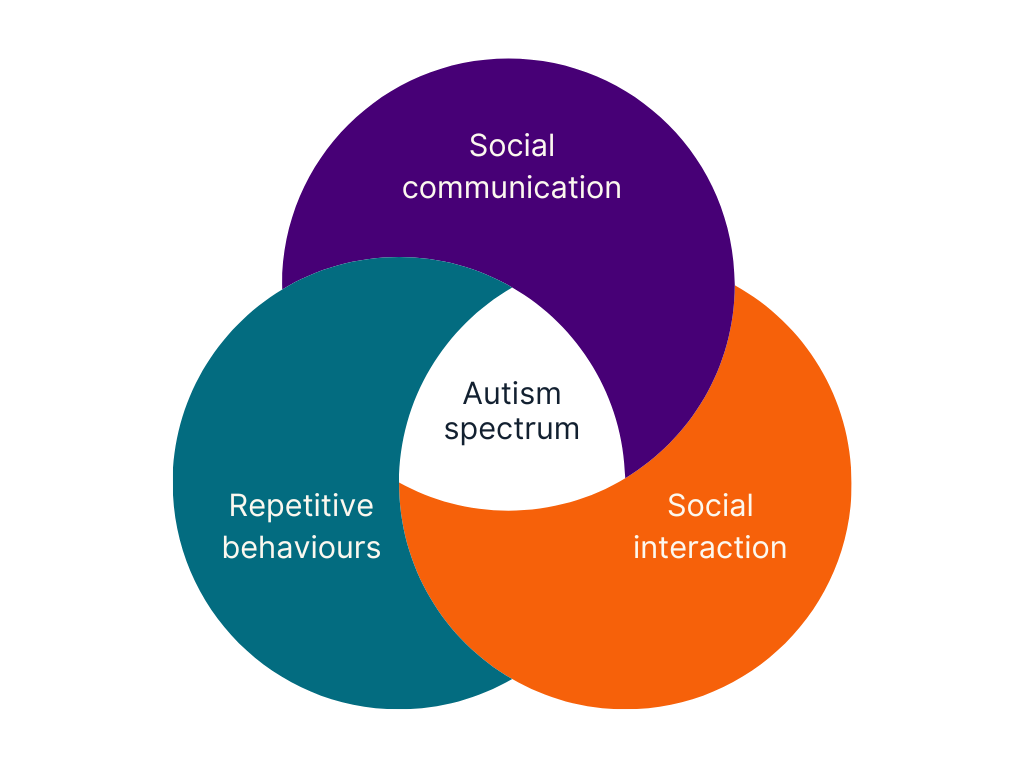Autistic people see, hear and feel the world differently from those around them. There are common areas of difficulty, but the challenges are different for each person.

Triad of impairment
Across the spectrum, three core features, known as the ‘triad of impairment’, are present in most autistic people to varying degrees. These core signs of autism persist throughout someone's life but differ in severity according to various factors, such as age, a learning disability or other comorbid conditions, and any therapy or treatment.
Social interaction
Many autistic people struggle with social interaction. This is when someone finds it difficult to build and maintain friendships, work in teams and know how to manage social situations. Difficulties may include:
- Social awkwardness
- Limited ways of responding socially
- Finding it hard to hold conversations
- Making social blunders
- Coming across as unconcerned for others
- Finding it hard to make or maintain friendships
Difficulties with social interaction tend to continue into adulthood. However, many autistic people can learn compensatory strategies that help them through uncomfortable social situations.
Social Communication
Difficulty understanding and translating body language, metaphors, and sarcasm are can all be signs of autism.
Common difficulties include:
- It can be hard for autistic adults to engage in social conversation naturally. Many avoid social situations altogether, but this can lead to feelings of loneliness resulting in people feeling anxious or depressed.
- Problems with social communication can manifest in an unusual use of gaze, facial expression and gesture. This differs from the persistent avoidance of gaze seen in shyness or depression.
- Difficulties with the non-verbal aspects of speech can make it very hard to understand conversations, leading to problems in relationships or at work.
- Understanding another person's opinion or point of view.
Many autistic people find these things incredibly difficult and can lead to social isolation, anxiety and depression. Therapeutic support in the form of coaching, psychology or psychotherapy can help autistic people develop skill sets that enable them to work more confidently in teams or build relationships.
Rigid Behaviours
A characteristic common across the autism spectrum is ‘restricted, repetitive’ behaviour. This can appear as an almost obsessive interest in a topic, repetitive body movements, such as rocking or hand flapping, particularly when stressed, or a strong preference for a set routine or way of doing things and huge discomfort if this does not happen.
Restricted interests or activities are interests or hobbies that are unusual in their intensity, content or the amount of time they absorb, particularly when they lack a social aspect. At their most extreme, the world of an autistic person might narrow to something (for instance, railway timetables or a TV programme) to exclude all other interests. These interests, whilst sometimes seeming a little eccentric to others around them, are key to the autistic person’s wellbeing and happiness.
Routines and Change
As the world can seem like a very unpredictable (even scary) place to an autistic person, a common characteristic of autism is resistance to change. This inflexibility can present as a person who becomes very set in their ways, with fixed routines and an aversion to anything new and changes to the ‘rules’ can result in angry outbursts or emotional distress.
Sensory sensitisation
Another interesting aspect of autism is an altered motor and sensory sensitivity to touch, light, sound and other external stimuli. Having over or under-active senses is common in the autism spectrum. The result is that the autistic person can seem very distracted and may seem to be daydreaming as they are preoccupied with experiences that others cannot appreciate. These sensitivities may also lead to various coping behaviours including avoidance of certain places or people, rocking or even self-injury to calm the overload of sensations experienced.
